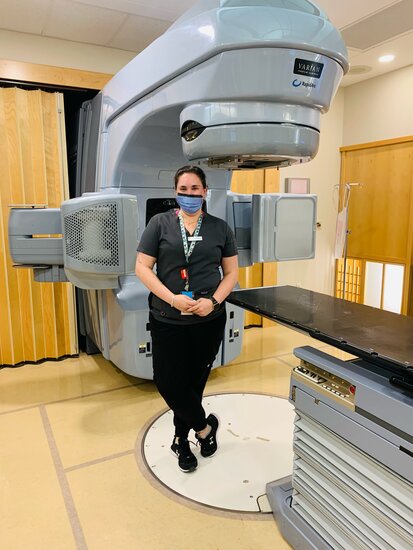
For Michener’s 2021 graduates, entering the workforce in the pandemic – often in a new city and an unfamiliar environment – was particularly challenging. We spoke to Meaghan Guistina Stayzer, a 2021 Radiation Therapy grad, about her experience starting a new position at the London Regional Cancer Program at Victoria Hospital in London Ontario. With the support of her colleagues, classmates and Michener alumni, Meaghan faced the challenges head-on and discovered some inspiring moments in her new role.
Michener: What were you expecting as you entered the workforce during the pandemic?
Meaghan: I was expecting the unexpected. I anticipated walking into a bit of chaos, but I was surprised how organized the environment was. The Centre had very clear steps in place for PPE and staff and patient safety. It was nice for me coming in and feeling nervous, then seeing that it was set up so well.
Michener: How has it been different than you expected?
Meaghan: Being a new staff member, new grad and entering health care during a pandemic, I had so many questions and I felt worried, but my colleagues were supportive and my supervisor was always available to answer question, and that helped with the transition.
I also realized quickly that because patients can’t bring a family member with them to the Centre because of COVID, I was now playing the role of the family member, social worker and Radiation Therapist. I was helping patients change from their clothes into gowns and taking them to the washroom. Normally a family member would do this, but now it’s us.
Michener: What kind of patients are you working with, and are you in direct contact with COVID patients?
Meaghan: We’re seeing more palliative cancer patients. Maybe because patients don’t want to see a doctor during the pandemic or procedures and surgeries are delayed. Occasionally we have a COVID patient, but it’s more common to have patients who have been in contact with someone who tested positive. When COVID patients do come in, we need to re-arrange our schedule because we typically book them at the end of the day and there’s a three-hour disinfection and clean-up following their appointment.
Michener: Did you feel prepared as a new grad entering health care right now?
Meaghan: My situation was unique because I volunteered for six months in long-term care during the first wave, and the home I worked at was 100% COVID positive. It was very eye opening and I’m so glad I did it. I already saw the worst of the worst, but I know it was difficult for my classmates who hadn’t been in contact with a COVID patient before.
Michener: Have you stayed in touch with your classmates and fellow grads? Have these connections helped you manage this challenging time?
Meaghan: I’m still in touch with quite a few of my classmates, and we’re spread across Canada now. Someone from my class works in Saskatchewan, and she’s had a very different experience than I have in London, so it’s nice to bounce ideas and thoughts off each other. It helps to have people we can be honest with who know us well.
Michener: Have you connected with other Michener alumni in your workplace?
Meaghan: About half of my department are Michener alumni. It’s like I have a built-in community, and it makes me feel more at home. I was lucky to start at a centre that’s already so welcoming, but I also have the Michener history with my colleagues. They know the kind of training and education I had, and they know what I’m already familiar with.
Michener: What do you want people to know about working in health care during the pandemic?
Meaghan: We’re taking on many different roles for the patient, and that can be overwhelming. I’ve learned to take a moment for myself and reflect on what I need as a health care professional.
Our patients comment that they end up feeling safe and cared for when they come in for treatment because we’re more than just a Radiation Therapist for them right now. Even with a mask on, patients can tell when I’m smiling, and this connection means a lot to both of us.